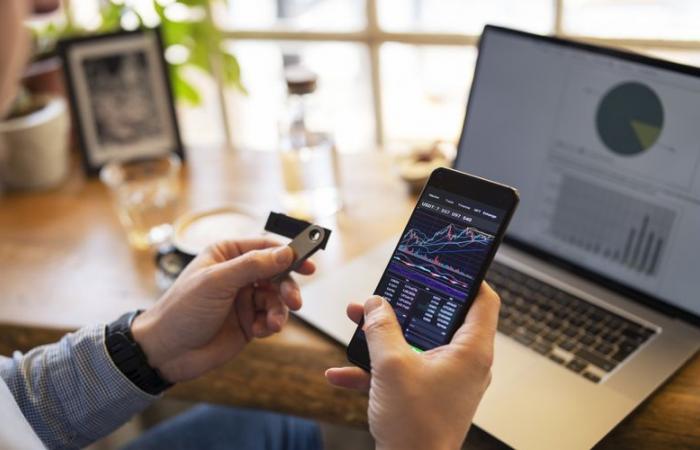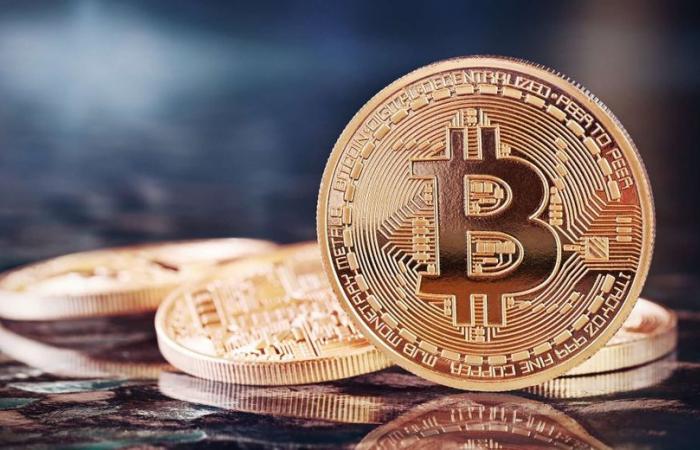the essential
Bitcoin crossed the $98,000 threshold last Thursday for the first time in its history. In full boom, the cryptocurrency sector anticipates more flexible legislation and economic policies that would be favorable to it under the future Trump administration, led by Elon Musk. Will this financial revolution be an opportunity or a mirage?
Re-elected by a wide margin as President of the United States on November 5, Donald Trump has not yet entered the Oval Office of the White House and can already claim economic success in the strategic cryptocurrency sector.
Since his election, in fact, bitcoin, the best known of cryptocurrencies, has seen its price soar: on Thursday, it crossed the threshold of 98,000 dollars for the first time in its history and experts see it well surpassing the $100,000 mark. Since the start of the year, the cryptocurrency has gained 122% with dizzying growth of +35% since Trump's election.
Also read:
Bitcoin, Ethereum… how do cryptocurrencies work, how to buy them, what are the risks…?
Trump's about-face on the regulation of cryptocurrencies
This jump can be explained because the sector expects a massive deregulation of cryptocurrencies that Donald Trump will initiate, who has made a 180° turn on the subject, undoubtedly convinced by Elon Musk, a strong supporter of cryptos. Indeed, during his first term, Donald Trump was in favor of strong regulation.
“I am not a fan of bitcoin and other cryptocurrencies, which are not money, and whose value is very volatile and based on emptiness. Unregulated crypto assets may facilitate illegal behavior, including drug trafficking and other illegal activities. […] If Facebook – which abandoned its Libra project, editor's note – and other companies want to become a bank, they must seek a new banking charter and submit to all banking regulations, just like other banks, both national and international. We have only one real currency in the United States, and it is stronger than ever, both reliable and trustworthy. It is by far the most dominant currency in the world, and it always will be. It's called the American dollar! »wrote the American president on July 12, 2019.
Also read:
TESTIMONIALS. Cryptocurrencies: “An extreme personal drama”… from euphoria to disillusionment, they risked investing
Today, Trump has changed his mind. “He criticized existing US laws and called for the US to become a bitcoin superpower. The Trump campaign is the first presidential campaign to accept payments in cryptocurrencies,” noted Anjana Susarla of Michigan State University.
The American president-elect has vowed to replace Gary Gensler, the boss of the financial markets watchdog, the SEC, hated by a sector which criticizes him for a repressive approach, and his choice to regulate cryptocurrencies like traditional financial securities. “The fact that certain crypto assets escape the definition of financial securities could greatly accelerate the approval of new investment products and increase the influx of capital into the sphere” of digital currencies, says Simon Peters of eToro.
Also read:
Bitcoin, dogecoin, ethereum…: what is a cryptocurrency and how does it work?
An American strategic reserve of bitcoins
Stéphane Ifrah, analyst at Coinhouse, notes that many companies in the crypto world are in fact in favor of “MiCA-type regulation”, the European Union regulation, which notably provides for mandatory approval for service providers around digital assets, which “would make them run fewer legal risks” according to him.
DR
Another flagship measure mentioned by Trump during his campaign is the establishment of a strategic national reserve of bitcoins. To constitute it, the American government would undertake to no longer sell the bitcoins already in its possession, mainly seized in the context of legal cases, currently numbering around 210,000, or the equivalent of around 19 billion dollars at current prices, according to Simon Peters. If such a project were to see the light of day, the United States could “potentially purchase bitcoins on the open market,” speculates the analyst, boosting demand and legitimacy for this digital asset.
Also read:
From bitcoin to dogecoin: billionaire Elon Musk is a fervent supporter of cryptocurrencies
A digital euro perhaps by the end of 2025
Trump's ambitions, more isolationist than ever, in cryptocurrencies are a strategic and sovereignty challenge for Europe, where the creation of a digital euro is lagging behind. The Eurosystem, which brings together the European Central Bank (ECB) and the national central banks of the member states of the euro zone, began this project in 2021 to create a virtual currency. Unlike cryptocurrencies, the ECB would issue and guarantee this new currency, as it does for cash euros.
Enough to reassure the general public and businesses who are still wary of cryptocurrencies. A first phase of investigation was carried out from October 2021 to October 2023, experiments must continue. The potential development and implementation of the digital euro could then take place from November 2025.
“The digital euro would make it possible to remedy dependence on non-European solutions in the field of payments” noted a French senatorial report last June. “These dependency situations, already problematic in normal times, could prove dangerous in the event of a crisis. More than an economic motivation, the digital euro therefore responds to a political project, that of strengthening sovereignty over payments in Europe. »







